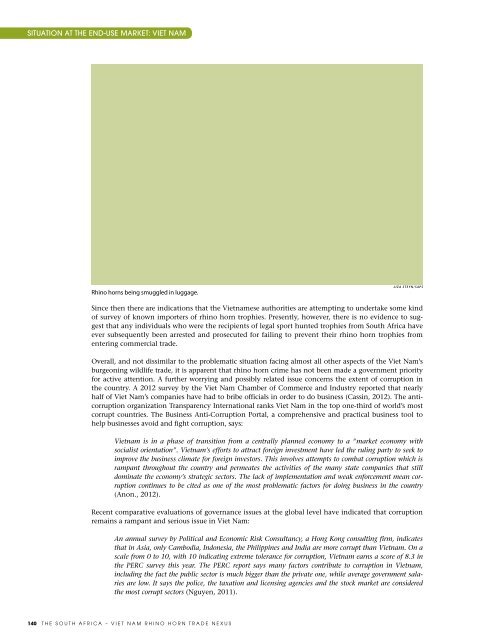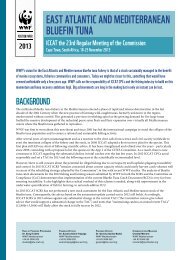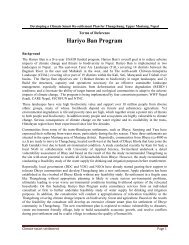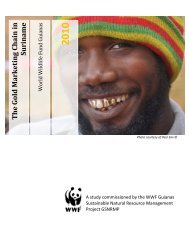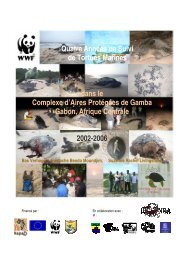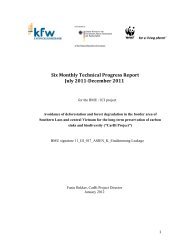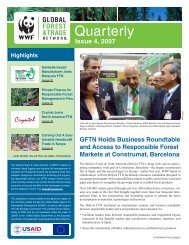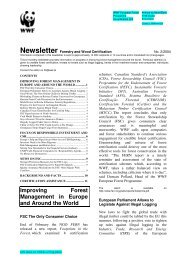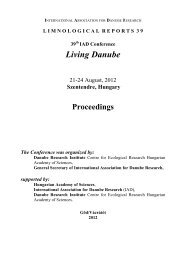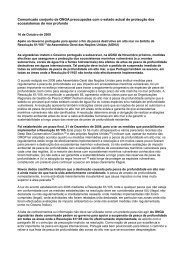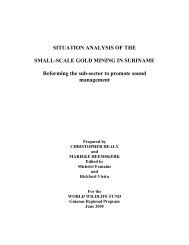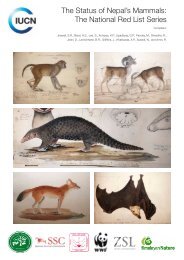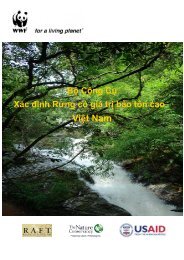The South Africa – Viet Nam Rhino Horn Trade Nexus (PDF ... - WWF
The South Africa – Viet Nam Rhino Horn Trade Nexus (PDF ... - WWF
The South Africa – Viet Nam Rhino Horn Trade Nexus (PDF ... - WWF
You also want an ePaper? Increase the reach of your titles
YUMPU automatically turns print PDFs into web optimized ePapers that Google loves.
situation at the end-use market: viet nam<br />
<strong>Rhino</strong> horns being smuggled in luggage.<br />
liza sTeyn/saps<br />
Since then there are indications that the <strong>Viet</strong>namese authorities are attempting to undertake some kind<br />
of survey of known importers of rhino horn trophies. Presently, however, there is no evidence to suggest<br />
that any individuals who were the recipients of legal sport hunted trophies from <strong>South</strong> <strong>Africa</strong> have<br />
ever subsequently been arrested and prosecuted for failing to prevent their rhino horn trophies from<br />
entering commercial trade.<br />
Overall, and not dissimilar to the problematic situation facing almost all other aspects of the <strong>Viet</strong> <strong>Nam</strong>’s<br />
burgeoning wildlife trade, it is apparent that rhino horn crime has not been made a government priority<br />
for active attention. A further worrying and possibly related issue concerns the extent of corruption in<br />
the country. A 2012 survey by the <strong>Viet</strong> <strong>Nam</strong> Chamber of Commerce and Industry reported that nearly<br />
half of <strong>Viet</strong> <strong>Nam</strong>’s companies have had to bribe officials in order to do business (Cassin, 2012). <strong>The</strong> anticorruption<br />
organization Transparency International ranks <strong>Viet</strong> <strong>Nam</strong> in the top one-third of world’s most<br />
corrupt countries. <strong>The</strong> Business Anti-Corruption Portal, a comprehensive and practical business tool to<br />
help businesses avoid and fight corruption, says:<br />
<strong>Viet</strong>nam is in a phase of transition from a centrally planned economy to a “market economy with<br />
socialist orientation”. <strong>Viet</strong>nam’s efforts to attract foreign investment have led the ruling party to seek to<br />
improve the business climate for foreign investors. This involves attempts to combat corruption which is<br />
rampant throughout the country and permeates the activities of the many state companies that still<br />
dominate the economy’s strategic sectors. <strong>The</strong> lack of implementation and weak enforcement mean corruption<br />
continues to be cited as one of the most problematic factors for doing business in the country<br />
(Anon., 2012).<br />
Recent comparative evaluations of governance issues at the global level have indicated that corruption<br />
remains a rampant and serious issue in <strong>Viet</strong> <strong>Nam</strong>:<br />
An annual survey by Political and Economic Risk Consultancy, a Hong Kong consulting firm, indicates<br />
that in Asia, only Cambodia, Indonesia, the Philippines and India are more corrupt than <strong>Viet</strong>nam. On a<br />
scale from 0 to 10, with 10 indicating extreme tolerance for corruption, <strong>Viet</strong>nam earns a score of 8.3 in<br />
the PERC survey this year. <strong>The</strong> PERC report says many factors contribute to corruption in <strong>Viet</strong>nam,<br />
including the fact the public sector is much bigger than the private one, while average government salaries<br />
are low. It says the police, the taxation and licensing agencies and the stock market are considered<br />
the most corrupt sectors (Nguyen, 2011).<br />
Against this backdrop, a range of sources continue to report ongoing collusion between vendors of illegal<br />
wildlife commodities and the law enforcement agencies charged with the protection of endangered<br />
species and control of banned substances in the marketplace (Nguyen and Nguyen, 2008; Smith,<br />
2012b). In fact, until very recently, denial of any kind of rhino horn trade problem at all has been a<br />
consistent refrain from <strong>Viet</strong>namese government officials. During bilateral deliberations between <strong>South</strong><br />
<strong>Africa</strong>n law enforcement officers and their <strong>Viet</strong>namese counterparts in Hanoi in October 2010, for<br />
example, the notion that <strong>Viet</strong> <strong>Nam</strong> only played the role of a transit country for onward trade to China<br />
was repeatedly heard through a succession of meetings with Forest Protection Department,<br />
Environmental Police and Customs officers. As further discussed below, there is very limited evidence<br />
of cross-border rhino horn trade between the two countries to support any such contention credibly.<br />
In comparison to <strong>South</strong> <strong>Africa</strong>, seizures of rhino horn at <strong>Viet</strong> <strong>Nam</strong>’s two international airports in Hanoi<br />
and Ho Chi Minh City have been relatively infrequent, but continuing (albeit unsubstantiated) anecdotal<br />
reports of government complicity in allowing “free passage” and “protection” continue to surface,<br />
for example the story of the wealthy woman who reportedly brought seven horns from <strong>South</strong><br />
<strong>Africa</strong> into <strong>Viet</strong> <strong>Nam</strong>:<br />
[She] said it had all been arranged through official connections. Nga sipped her coffee and said the<br />
woman was extremely nervous about having the horns, which was why she insisted on secrecy. Nga said<br />
that without the right contacts it wouldn’t have been possible to smuggle it in. “Ordinary people couldn’t<br />
do it,” because it is “so illegal” (Smith, 2012b).<br />
Other stories indicate that individuals apparently located at key international airports function as<br />
important sources of rhino horn, although it is not clear whether the horns in question were previously<br />
seized or not:<br />
I told her I was interested in buying some because my father has cancer and rhino horn was not available<br />
in Australia; she said it was a good idea to buy some for him and she would like to help me. She<br />
called her uncle then and there and he said he’d make enquiries. He came back saying his contacts at<br />
Saigon’s Tan Son Nhat International Airport didn’t have any [rhino horn] at present (Smith, 2012b).<br />
And once inside the country, other individuals with rhino horn apparently remain unconcerned about<br />
the potential consequences of having an illegal substance because of the perception that their personal<br />
contacts and connections resulted in protective immunity:<br />
Diem added that her mother … was not concerned about the illegality of the rhino horn because of her<br />
connections with Hanoi’s Vien kiem sat nhan dan (<strong>The</strong> People’s Court of Investigation). With connections<br />
like these her mother could do “whatever she wanted”. Diem smiled broadly saying she was happy<br />
to get some for me if I wanted at which point my friend changed the subject (Smith, 2012b).<br />
“Protection”, if it indeed exists at all, is not necessarily pervasive as rhino horn seizures have taken<br />
place on numerous occasions, both at Noi Bai International Airport in Hanoi in the north and Tan Son<br />
Nhat International Airport in Ho Chi Minh City in the south, as well as at various border crossings<br />
along the Lao border and in the marketplace, especially in Hanoi. According to the Forest Protection<br />
Department, by mid-2009, approximately 100 kg of rhino horns had been seized and were being stored<br />
at the National Treasury as valuable commodities (Vice-Director of VN CITES MA, pers. comm., June<br />
2009). Since then, the <strong>Viet</strong>namese government has reported that, from 2006 through 2008, 12 seizure<br />
cases have occurred at the country’s international airports, yielding a total of 118 kg of rhino horn<br />
(Tung, 2011). News reports and other published sources available to TRAFFIC yield details on seven<br />
such rhino horn seizures that were made at <strong>Viet</strong> <strong>Nam</strong>’s international airports since 2004:<br />
In October 2004, a “young” <strong>Viet</strong>namese student who was studying at Nelson Mandela Metropolitan University<br />
in Port Elizabeth, <strong>South</strong> <strong>Africa</strong>, was apprehended at Hanoi’s Noi Bai International Airport carrying<br />
two White <strong>Rhino</strong> horns, totalling 10.75 kg. <strong>The</strong> suspect, who had previously worked in Angola for two<br />
years before coming to <strong>South</strong> <strong>Africa</strong> for studies, claimed to have bought the horns from a local man on<br />
a farm near Johannesburg for USD11 000. This individual was reportedly expelled from school and was<br />
given a two-year suspended prison sentence on probation by the People’s Court of Hanoi (Tien, 2006).<br />
In November 2004, a man was detected carrying four rhino horns which were seized by Customs officers at<br />
Noi Bai International Airport upon his arrival in <strong>Viet</strong>nam. Reportedly the director of a company based in<br />
140 the south africa <strong>–</strong> viet nam rhino horn trade nexus TRAFFIC 141


